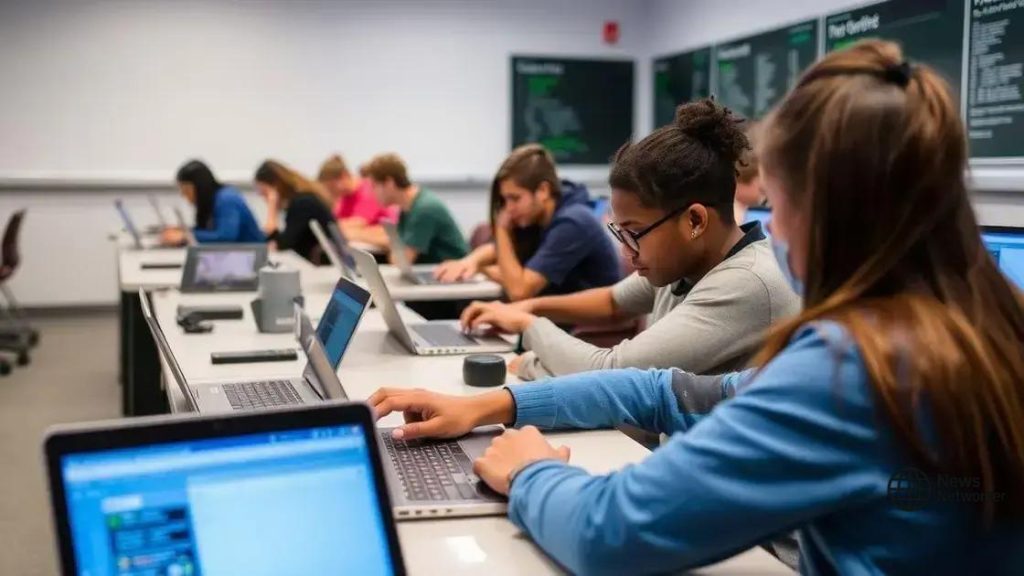Elementary-level programming course mandate: What you need to know

Choosing the right programming course involves setting clear goals, researching course content, practicing regularly, seeking feedback, and connecting with a supportive community to enhance your coding skills and ensure effective learning.
Elementary-level programming course mandate plays a crucial role in shaping the future of young learners. Curious about how coding can empower the next generation? Let’s dive into the essentials.
Understanding the basics of coding
Understanding the basics of coding is essential for anyone looking to dive into the world of technology. Coding enables communication with computers and creates a foundation for future skills. But where should you start?
What is coding?
Coding, also known as programming, is the process of creating instructions for computers to follow. These instructions are written in programming languages, which include Python, Java, and C++. Each language has its own syntax and rules, making them unique.
Why learn coding?
Learning to code opens up a world of opportunities. Here are some benefits:
- Enhances problem-solving skills
- Boosts creativity through project development
- Prepares for careers in tech
Starting with the basics can be fun and engaging. For example, visual programming languages like Scratch allow beginners to create animations and games easily, which makes learning enjoyable. As you progress, you will encounter more complex concepts, but the foundation will remain vital.
Additionally, hands-on practice is key. Try working on small projects or participate in coding challenges online. This not only helps reinforce what you learn but also builds confidence.
In conclusion, mastering the basics of coding is a stepping stone to unlocking future advancements in technology. Keep exploring and practicing, and you’ll see how coding can transform your ideas into reality.
Benefits of starting programming early
Starting programming early can be incredibly beneficial for young learners. It not only teaches them valuable skills but also shapes their thinking. With coding, children can develop a deeper understanding of technology and its applications.
Enhances cognitive skills
Learning to code at a young age boosts problem-solving abilities and enhances logical thinking. Kids learn to break down complex problems into smaller, more manageable tasks. This practice becomes valuable in everyday life.
Fosters creativity
Programming encourages creativity as students create their own projects. Whether it’s designing a website or developing a game, coding allows kids to express their ideas freely. This creative process keeps them engaged and makes learning fun.
- Promotes critical thinking
- Encourages collaboration with peers
- Builds a foundation for future learning
Moreover, starting early helps establish a base in computer science concepts. Children exposed to programming languages can adapt more smoothly to advanced topics later. They are likely to excel in STEM fields, which are increasingly essential in our tech-driven world.
The earlier learners encounter programming, the more opportunities they’ll have. As they progress, they can tackle more challenging projects. This leads to a sense of accomplishment and confidence in their abilities, making them more likely to pursue technical careers.
Essential programming languages for beginners

When starting with programming, choosing the right language is crucial. Several languages are considered essential for beginners, thanks to their simplicity and widespread use. Learning these languages builds a strong foundation for future coding adventures.
Python
One of the most popular programming languages for beginners is Python. Its syntax is clear and intuitive, making it easy to learn. With numerous applications, such as web development, data analysis, and artificial intelligence, Python opens many doors for aspiring coders.
JavaScript
JavaScript is another essential language. It is primarily used for web development, allowing users to create interactive websites. Learning JavaScript empowers beginners to enhance their front-end skills and understand how the web works.
- Easy to understand syntax
- Widely used in web development
- Allows creative projects
Another beginner-friendly language is Ruby. Known for its elegant syntax, Ruby is designed for productivity and simplicity. It’s often used in web applications, and beginners can quickly build projects with Ruby on Rails.
Moreover, Scratch is an excellent starting point for younger learners. This visual programming language allows kids to create games and animations by snapping together code blocks, helping them grasp programming concepts without learning complex syntax.
Understanding these essential languages provides a solid base. As learners advance, they can easily transition to more complex languages, enhancing their coding skills and career prospects.
How to choose the right course
Choosing the right programming course can make a big difference in your learning journey. With so many options available, understanding what to look for is essential for success. Start by considering your interests and career goals.
Identify your goals
What do you want to achieve by learning to code? Whether it’s web development, game design, or data analysis, having clear goals will help narrow down your choices. Focus on courses that align with your specific interests.
Research course content
Course content is vital. Look for courses that cover fundamental programming concepts and real-world applications. A good programming course should include:
- Hands-on projects to apply learning
- Access to resources and tutorials
- Opportunities for collaboration
Additionally, consider the teaching style. Some people thrive in structured environments while others prefer self-paced learning. Choose a course that matches your learning preferences to stay motivated and engaged.
Another factor is the community support. Online forums, group projects, and mentorship can enhance your experience. A strong community allows you to connect with peers and seek help when needed, making the learning process much richer.
Finally, don’t forget to read reviews or testimonials from former students. They can provide insights into the course quality and effectiveness. This feedback can guide you in making a well-informed decision.
Tips for succeeding in your programming journey
Succeeding in your programming journey requires dedication and smart strategies. Whether you are just starting or looking to enhance your skills, these practical tips will help guide you.
Set clear goals
Establishing clear and achievable goals gives your learning direction. Break down larger goals into smaller, manageable tasks. For instance, if you want to learn Python, start by mastering basic syntax before moving on to more complex topics.
Practice regularly
Practice is vital for mastering programming skills. Dedicate time each day or week to write code and tackle different challenges. This keeps your skills sharp and helps you retain knowledge better.
- Join coding challenges and competitions
- Work on personal projects
- Contribute to open-source software
Engaging with practical examples allows you to apply what you have learned. Additionally, working on real projects can boost your problem-solving abilities as you face different coding scenarios.
Another important aspect is to seek feedback. Share your code with peers or mentors and learn from their insights. Constructive criticism can highlight areas for improvement and give you new perspectives.
Stay updated with the latest trends in programming and technology. Follow blogs, listen to podcasts, and participate in online communities. Connecting with other learners can also provide motivation and inspiration throughout your journey.
Don’t hesitate to learn from mistakes. Programming involves debugging and troubleshooting; encountering errors is part of the process. Embrace these challenges as opportunities for growth.
FAQ – Frequently Asked Questions about Starting Your Programming Journey
What is the best programming language for beginners?
Python is often recommended as the best programming language for beginners due to its simple syntax and wide range of applications.
How much time should I dedicate to learning programming?
It’s ideal to spend at least a few hours each week coding. Consistency is key, so try to practice regularly to build your skills.
Are there free resources available to learn programming?
Yes, there are many free resources online, such as Codecademy, FreeCodeCamp, and educational YouTube channels that offer great tutorials.
How can I stay motivated while learning to code?
Join coding communities, set achievable goals, and work on projects that interest you. Sharing your progress with others can also help maintain motivation.





